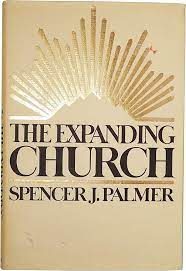Articles/Essays – Volume 12, No. 2
World-Wide | Spencer J. Palmer, The Expanding Church
On first impression, Spencer Palmer’s new book may not appear promising. One wonders silently how even a man of Palmer’s talents could make a coherent whole from twenty-three such diverse chapters. Not only is there a wide variety of modes of presentation, theme and genre, but there are at least eight identifiable authors. If this is an experiment in writing, however, it is a successful one.
Palmer’s book joins the recent biography of President Kimball as an account that is able to deal realistically with serious problems facing the Church and its individual members without wearing the dark glasses of cynicism. Rather, he finds beauty and genuine inspiration in life as it is actually lived. Any serious reader will find this powerful, believable and valuable. Palmer’s book accomplishes many things. Of considerable interest and value is his compilation of the history of the international expansion of the Church and the statistics documenting these developments. Also of great value is his sensitive correlation of prophetic statements on the international responsibility of the Church. The central point of the book is a fireside talk in which Elder Bruce R. McConkie, with characteristic clarity and vision, develops these themes. The book also offers well-informed assessments of the practical difficulties facing the Church in its world-wide mission. Essays by David M. Kennedy and Soren F. Cox detail this challenge from their respective perspectives as ambassador for the Church at large and as first mission president in a strange, new culture. Insightful comments placed throughout the book by the author himself add to this dimension. Finally, and the high point of the book, is the collection of carefully assembled autobiographical accounts of the initial experiences of three convert families and their subsequent growth in the Church over two or more generations. The convincing reality, the contagious humility and the pervasive spirituality of these accounts raise the reader to insight and spiritual empathy.
We live in a day when the inability of our youth and many adults to distinguish between genuine spiritual experience and concocted sentimentality has created a rich market for those who can grind out tearjerking stories. In the three family stories he presents Palmer has provided us with a unique counter to these. My favorite is the autobiographical account of Pablo Choc, a poor Guatemalan Indian whose sole livelihood since his earliest memory was the produce of the small plot of land and the animals his family was able to maintain. As Brother Choc recounts his earliest political and social experiences and his subsequent exposure to the gospel, we read of a simple man who speaks the truth about universal human experiences. No attempt is made to shape his experience or the Church to fit idealized preconceptions. Rather, we see an honest man who, like Joseph Smith, was satisfied from his own investigation that the competing religions of his day did not seem to have the truth. As he struggled with the routine challenges of life he kept an eye out for answers to his questions about higher matters. There is a world of difference in the level of sophistication of the world in which Pablo Choc was living when the missionaries found him and the world in which most missionary contacts live. But there is a similarity in feelings, the insights and the spiritual witness that he recounts when he observed the missionaries conducting a funeral for the mother of his Mormon friend, and then later as they came to his own humble home. As he tells of his conversion and his gradual affiliation with the Church, every honest reader will see his own experiences, his own life, his own temptations and his own victories. This story poses a challenge to wealthy and sophisticated American and European members of the Church: For if one’s heart is proud, and one despises the poor, here is a man he cannot despise. This uneducated Guatemalan Indian is our brother. He is an elder and a president of a branch of the Church of Jesus Christ of Latter-day Saints. He has dedicated nineteen years of his life to the building up of the kingdom in his village. His oldest son, Daniel, was able to become a missionary with the support of $100 a year which Pablo and others provided and his life was taken in an accident while he was helping members of the Church restore an earthquake-damaged home.
Palmer artfully joins diverse elements into an effective and coherent work. Although he does not raise the obvious questions that each reader must raise for himself, he seems to be saying that the membership of the Church around the world must ultimately embrace all their brothers and sisters in the equality of the Saints. Palmer’s book carries many valuable messages, but this is one of the chief among them.
The Expanding Church. By Spencer J. Palmer. Salt Lake City: Deseret Books, 1978. 232 pp., $6.95.


 Back to full Issue
Back to full Issue

